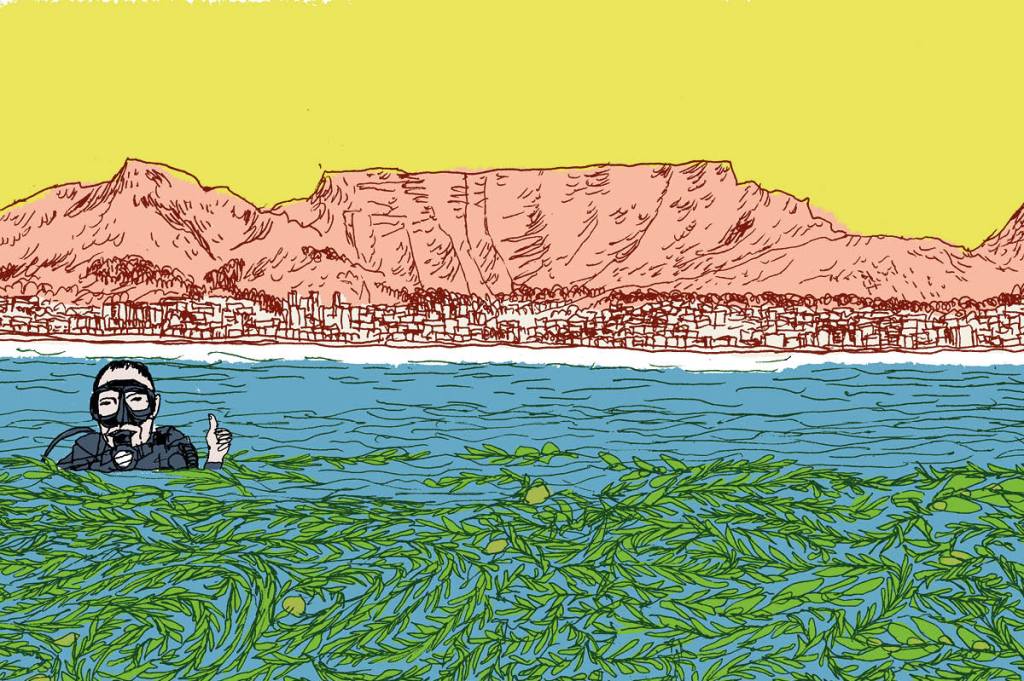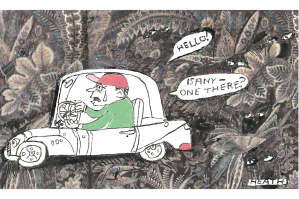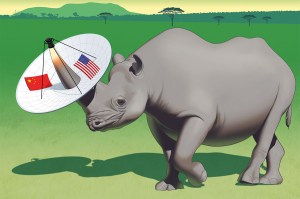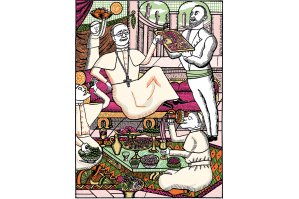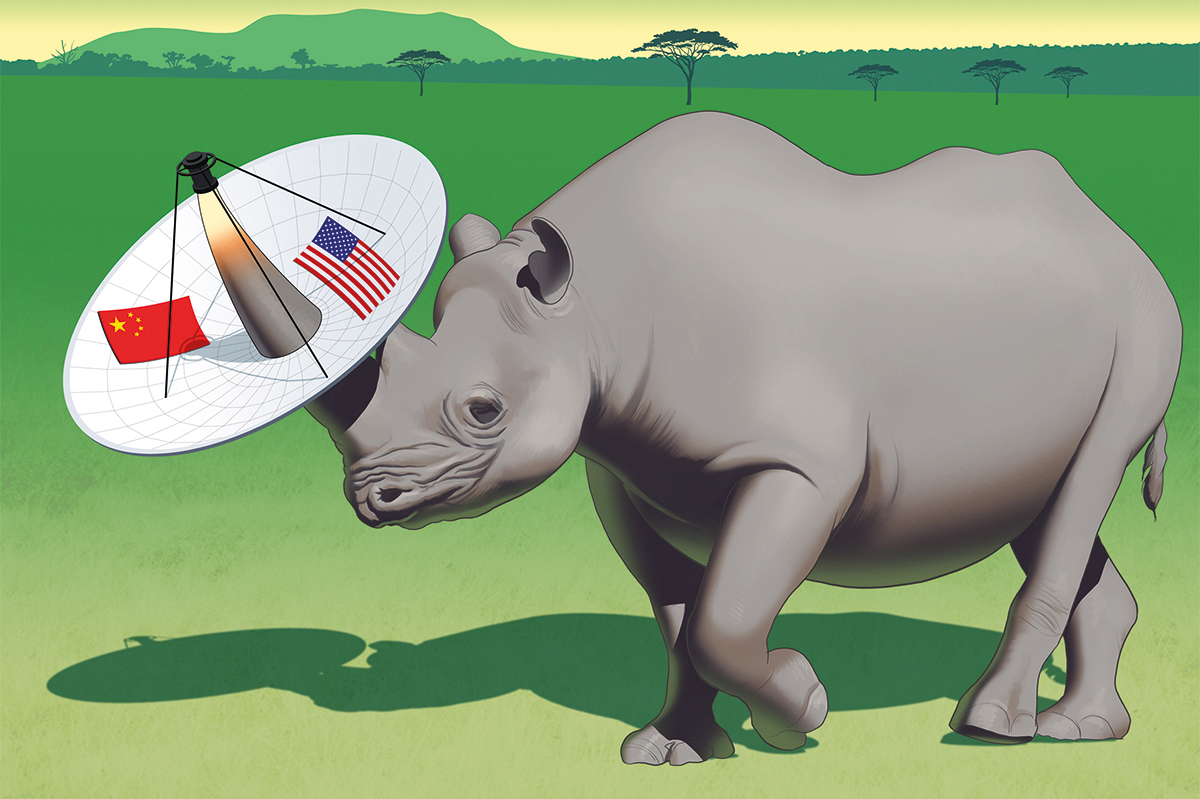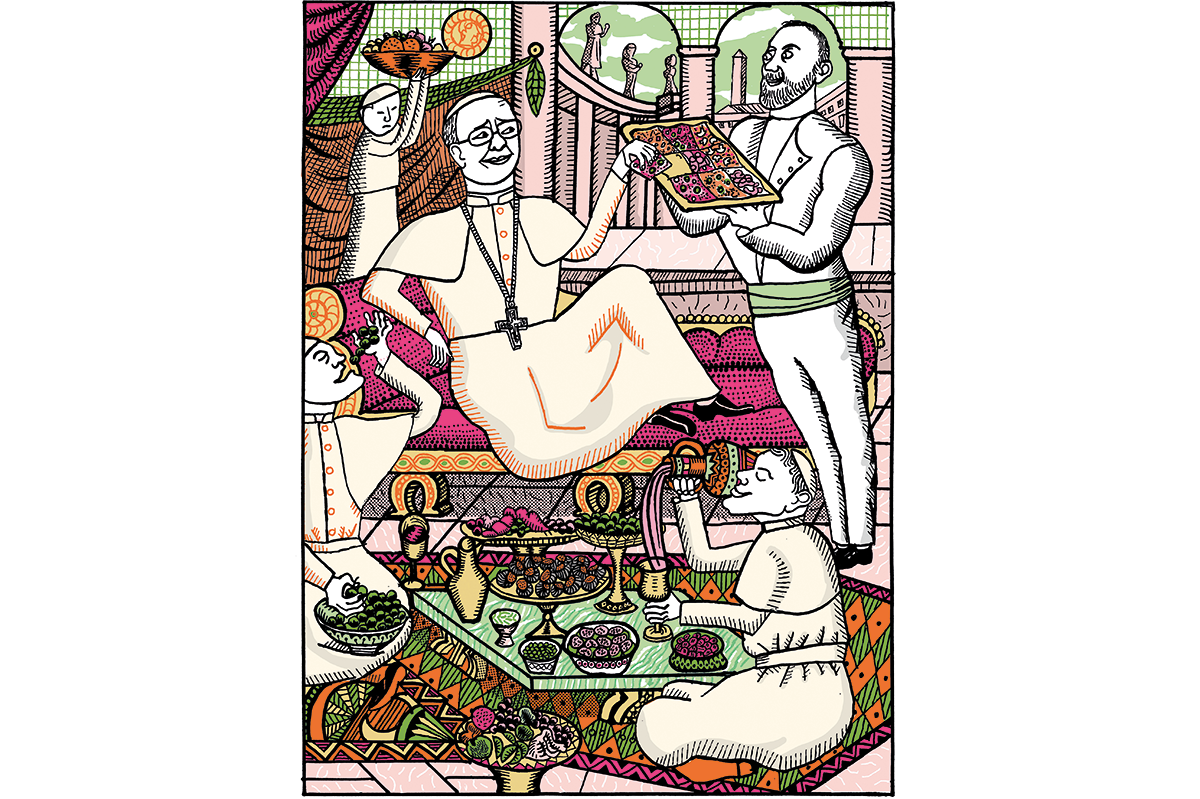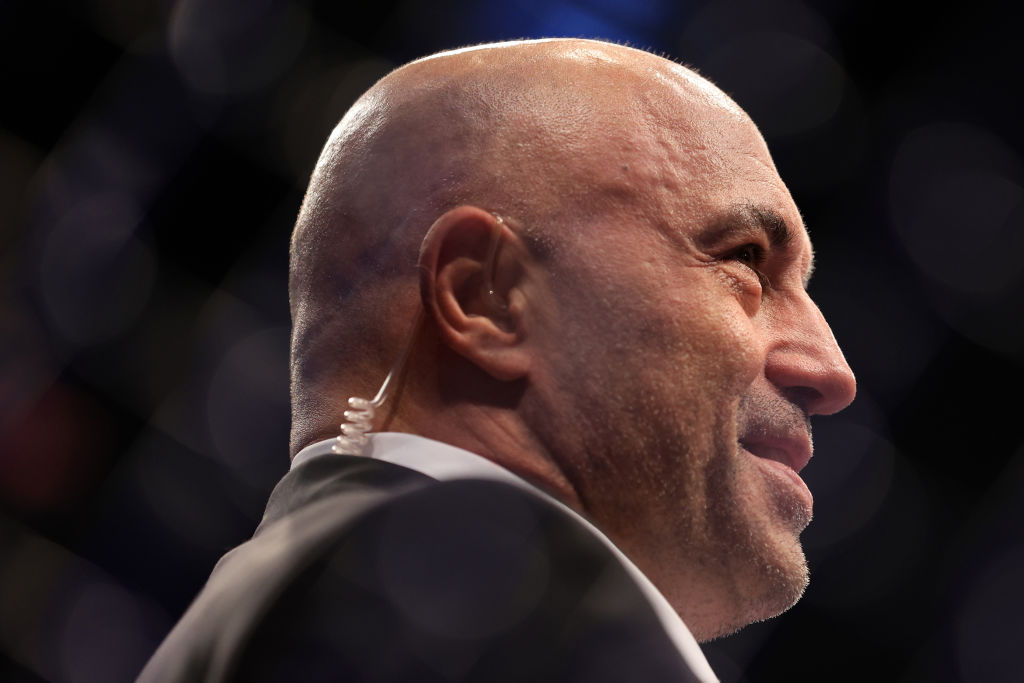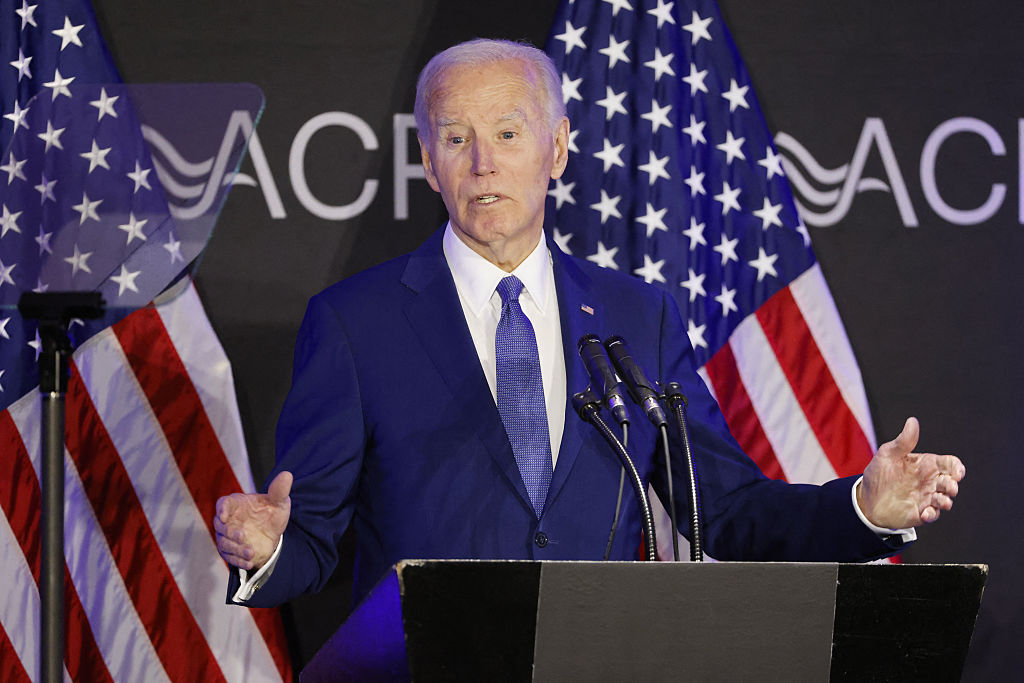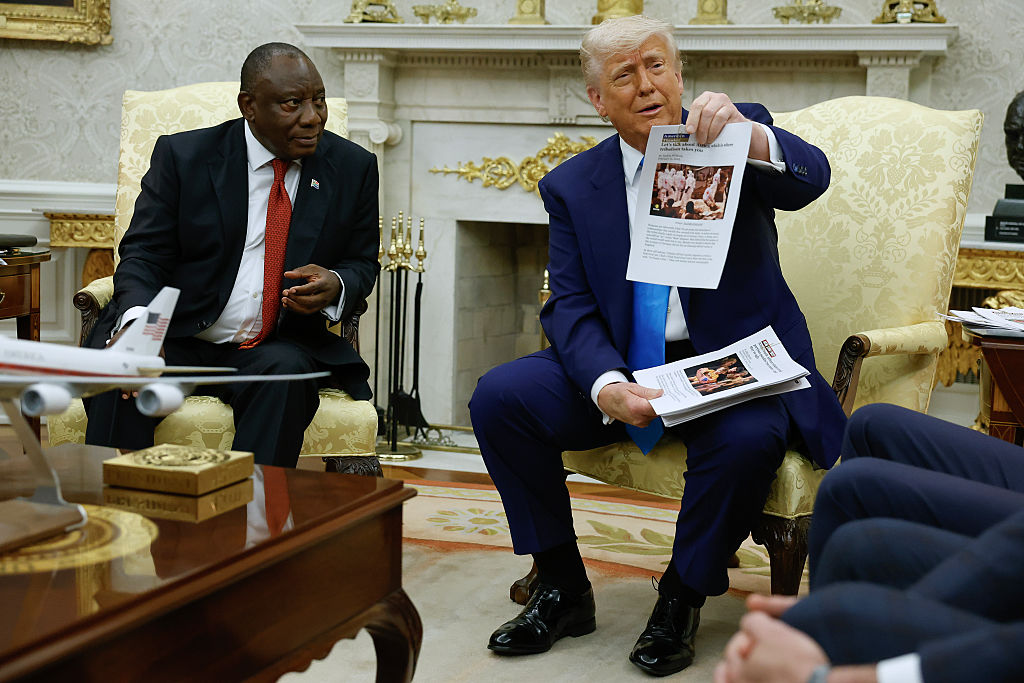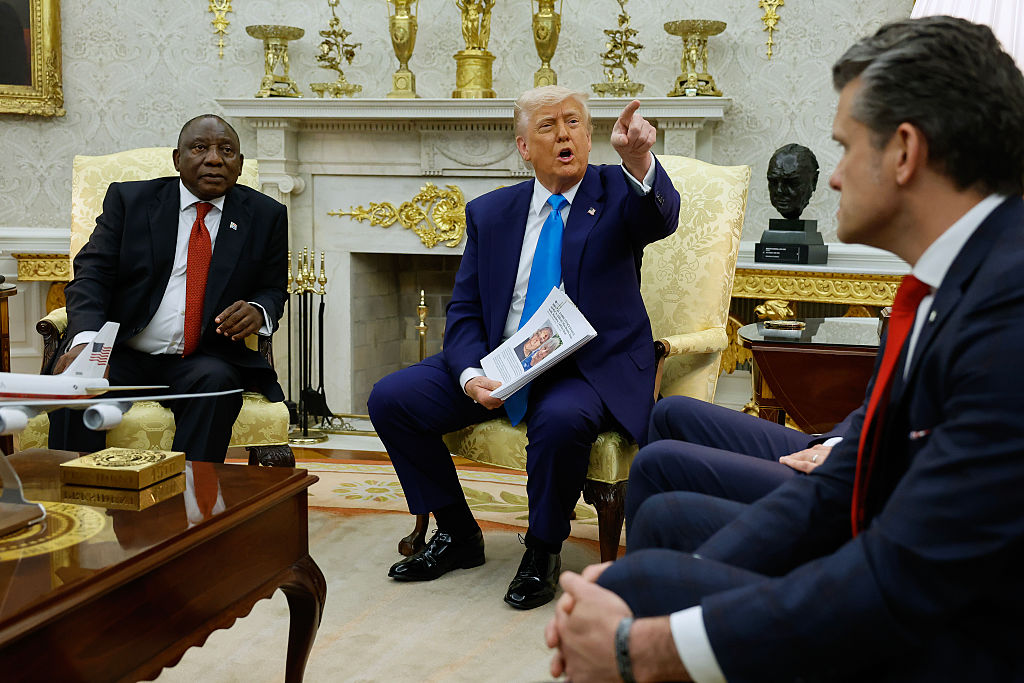Thirty feet underwater, somewhere on the False Bay coast near Simon’s Town in the Western Cape, South Africa. I’m getting battered by a strong current, deep in a kelp forest. I squint upwards and spot a pair of flippers. Kicking… upwards. My friend Abie is in a pickle.
First of all, she’s vertical — not desirable in diving gear — and I can see now, she’s tangled. Brown kelp fronds the girth of beer cans shoot up all around us, forming a confused mass. I panic but try not to show it. Being buddied up with an old mate for a genuinely dangerous sport — you’re expected to know what you’re doing — has its downsides. I realize we are the responsible adults I’m looking around for. My PADI (Professional Association of Diving Instructors) training kicks in, and I take long, deep breaths as I make my way up to wrangle her out of the tangle.
She gives the thumbs-up signal, diving-speak for “fuck this.” We ascend together, then bob on the surface holding hands, suddenly paralyzed by fits of relieved, uncontrollable laughter. Our faces are blanched alabaster underneath neoprene diving hoods, feet numb from the icy Atlantic waters. We cackle and snort, choking on sea water as we paddle back to our boat. Smiley Mike of Pisces Divers hauls us aboard, and we warm up with fresh tea, chocolate and tales of the Netflix smash My Octopus Teacher, filmed nearby.
Conditions aren’t on our side, but we love watching hundreds of seals bask in the sun at Partridge Point, an exposed haul-out spot. An earlier dive took us to a shallow section of the reef, “the amphitheater,” where playful pups swooped around us like a litter of aquatic Labradors. Now though, we need a hot shower — and lunch.
We grab a quick taxi to plush (but oh so friendly) Tintswalo at Boulders, our charming digs overlooking the famous African penguin colony on the beach. We eat on the balcony, peering through binoculars at the funny little creatures, before some winter sunbathing (joy) and a dip in the rooftop jacuzzi. We’ve nabbed one of just nine suites, each with direct gate access to Boulders Boardwalk. Tintswalo’s owners are passionate about their home. I’d been drawn to their work with charity partners as well as their location, supporting local performing arts and a rhino conservation program. We pad down to the granite rocks and get the obligatory snaps surrounded by flightless seabirds.
It’s a short journey to sleepy Kalk Bay for dinner with old friends. They’ve been traveling for a while, pausing here to rent a 4×4 to drive the length of Africa. They take us to shops laden with local handmade crafts and linens, then stop at harbor-facing Salt, its chalkboard teeming with global dishes. You might try kudu goulash, flash-fried zucchini or butternut ravioli by candlelight. We order almost everything on the wall.
After crashing back at Tintswalo (to the tune of ocean waves — is this real life?), we stop for morning pastries at Olympia Cafe. Our good friend Sophie joins us in the emerging hipster spot Muizenberg, where we grab snacks at ethically sourced, veggie-friendly community space Commons Café. We idly watch people emerge from the water at Surfers Corner. “Everyone here looks so fit and healthy,” we muse, ordering a bottle of wine. A loud siren goes off moments later. “Shark alarm!” our server nods. We’re happy with our life choices.
Charlie insists on picking us up, eager to show off Chapman’s Peak Drive with his new wheels — and he’s got some surprises up his sleeve. Buzzed from the booze, we’re delighted; the toll road winds between Noordhoek and Hout Bay, and is said to offer jaw-dropping views of the Atlantic Coast. We’re taken to sun-soaked Cape Point Vineyards “for bubbles and oysters,” and stop in our tracks as we enter the gardens. A 360-degree view of the Chapman’s Peak mountain range, the fynbos biome, vineyards and ocean fans out in front of us. Picnickers dive into a sparkling lake just beyond the manicured grass, wine glasses lined up on the decking. “This is heaven,” I say. “There’s a community market here on Thursdays. It’s amazing,” comes the reply.
Bubbles and oysters secured (costing less than a sandwich back in London), we move on to Aegir Project Brewery, where IPA and lager flights whizz out of the taproom while a band plays. The sun is dappled through a canopy of trees and a gentle wind breezes through. As time marches on, we’re shooed into the car — the brewery is a five-minute climb from the world-famous 9km stretch. We blast songs we grew up dancing to in grimy British clubs and sing at the top of our lungs, ecstatic to have precious time together in this unbelievable setting. I realize I’m crying a bit, and set Abie off again. “Blame the wine!” we screech, feeling impossibly lucky as we press our noses to the window.
Suddenly, a sheer drop. We round a curve, then a few more, and so it begins — it’s up there with the most scenic drives of our lives. We stop for photos. “Pretend Soph’s just said something hilarious,” Charlie says, commanding us to “act natural.” It doesn’t take much for us to collapse in real fits, faces wet once again.
“We’re not done yet,” he insists. We pile back in the car, then pick our way barefoot to misty Long Beach for a long walk on a seemingly endless stretch of flat white sand. Exhausted, we’re dropped off at family-run Ibis House, hidden in the pretty wine-producing suburb of Constantia.
About halfway back to Cape Town, this boutique villa is set on seven acres of private garden dotted with ponds and streams. A swing hangs from a beautiful old tree. Inside, an imposing double spiral staircase leads to six bedrooms with marble-finished spa bathrooms, some with balconies overlooking the pool. Owners Suzanne and Olivia insist we join them for a coffee in the morning.
Early next morning, we’re desperately in need of said caffeine. Olivia springs into the hallway, taking us by the hand. “We started serving coffees to walkers in the forest during Covid — and it gave us the idea for Secret Forest Café,” she explains.
We’re led through her garden gate, directly onto the edge of the stunning Tokai Forest. Dog-walkers, horse-riders and joggers line the dirt road, waiting for smoothies and handmade dog biscuits. Breathtaking mountains stretch out behind them. The atmosphere is so perfect, it almost feels uncanny — crisp sunshine, nice people and simple, local produce. We spend a couple of blissful days strolling around, lazing by the pool and wandering through the kitchen garden before setting off for some time in town.
We check into the preposterously pleasant — and Pepto-Bismol pink — Mount Nelson, a Belmond hotel in the heart of the city. It’s awash with pastels, ladies donning pink for the famed Afternoon Tea. We eat cake while a pianist plays, then aim for the maze of drinking dens around Kloof Street. The concierge reminds us it’s not safe to walk back alone at night, particularly during the power cuts called “load-shedding,” when phone lines, traffic lights and security measures go down.
These government-enacted power cuts take place in South Africa daily — a last-ditch measure to balance the demand and supply of electricity. Huge generators power big hotels, bars and restaurants, but smaller businesses — and thousands of families — are not so lucky. When the lights go off (just for a moment, or for several hours per day, depending on where you’re situated) it’s a sobering reminder of the stress the country is under, the hangover of its tumultuous history.
We’re humbled, as we have been countless times on this trip, by this bump back to reality. I feel ashamed, suddenly embarrassed about what a magical time I’ve been having. Though a space of unparalleled luxury — like so many I’m privileged to explore on this trip — the Mount Nelson had piqued my interest with its community uplift programs. The hotel invests in excess food redistribution, charity initiatives and mentoring partnerships, and “reduce, reuse, recycle” plans are ramping up.
Instead of handwringing, we resolve to get comfortable feeling uncomfortable, and help in what small ways we can. We book a tour of the ethnically diverse Bo Kaap district with a local guide, take the boat to Robben Island (where Nelson Mandela was incarcerated for eighteen years) and explore the District Six Museum — all of them need their ticket sales to remain open. We cycle around Langa township, picked up and guided by passionate Mzu, raising money for a youth development project. I direct my travels to Johannesburg the next month, visiting the world-class Apartheid Museum, and Mandela House in Soweto.
In return for heavenly hospitality, astonishing scenery and laugh-until-you-cry moments, checking our priorities (and our privilege), is a small price to pay — no matter what country we’ve landed in.



